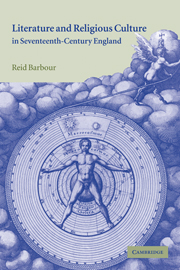Book contents
- Frontmatter
- Contents
- Acknowledgements
- Introduction: spirit and circumstance in Caroline Protestantism
- Chapter 1 The church heroic: Charles, Laud, and Little Gidding
- Chapter 2 Great Tew and the skeptical hero
- Chapter 3 Between liturgy and dreams: the church fanciful
- Chapter 4 Respecting persons
- Chapter 5 Decorum and redemption in the theater of the person
- Chapter 6 Nature (I): post-Baconian mysteries
- Chapter 7 Nature (II): church and cosmos
- Conclusion: Rome, Massachusetts, and the Caroline Protestant imagination
- Notes
- Index
Chapter 6 - Nature (I): post-Baconian mysteries
Published online by Cambridge University Press: 22 September 2009
- Frontmatter
- Contents
- Acknowledgements
- Introduction: spirit and circumstance in Caroline Protestantism
- Chapter 1 The church heroic: Charles, Laud, and Little Gidding
- Chapter 2 Great Tew and the skeptical hero
- Chapter 3 Between liturgy and dreams: the church fanciful
- Chapter 4 Respecting persons
- Chapter 5 Decorum and redemption in the theater of the person
- Chapter 6 Nature (I): post-Baconian mysteries
- Chapter 7 Nature (II): church and cosmos
- Conclusion: Rome, Massachusetts, and the Caroline Protestant imagination
- Notes
- Index
Summary
In the 1620s and 30s, the various respects of English Protestantism tend to converge in the study of nature, so that a radical reconsideration of what Seneca calls the pneumatic “circumstance” of human existence serves to center the stocktaking of all the conditions of Protestant faith and practice. With nature as their chief concern, writers trace the network of connections between the advancement of natural studies and all the modes in which they live out their religion: in time (the heroic past, the pivotal present, and the apocalyptic future); in thought (the internal respects of logic, knowledge, error, language production, and imagination); in worship; in the search for salvation; and in a society respectful of persons.
Fully launched in the 1620s, Bacon's Great Instauration prompts the painstaking and complex investigation of religious circumstances — the respects of person, place, time, heroism, thought, and ceremony — through his clarion call for the transformation of natural philosophy. From his announcement of a new method and a comprehensive plan in 1620, through the natural histories and the De Augmentis of the first half of that decade, leading up to that recasting of a religious society in the New Atlantis of the early Caroline years: Bacon's transformation of the study of nature magnifies the stakes, complicates the dynamics, and promises unprecedented resolution of the intellectual labors taken over the conditions of holy living. This transformation stimulates the naturalized stocktaking of religious circumstances carried out by such diverse writers as George Hakewill, Edward Herbert, William Harvey, and Thomas Browne.
- Type
- Chapter
- Information
- Literature and Religious Culture in Seventeenth-Century England , pp. 176 - 209Publisher: Cambridge University PressPrint publication year: 2001

